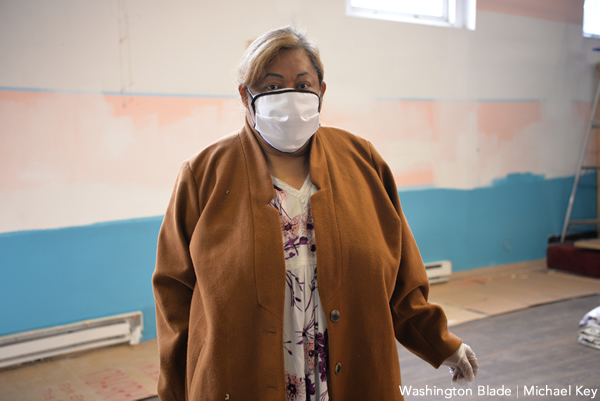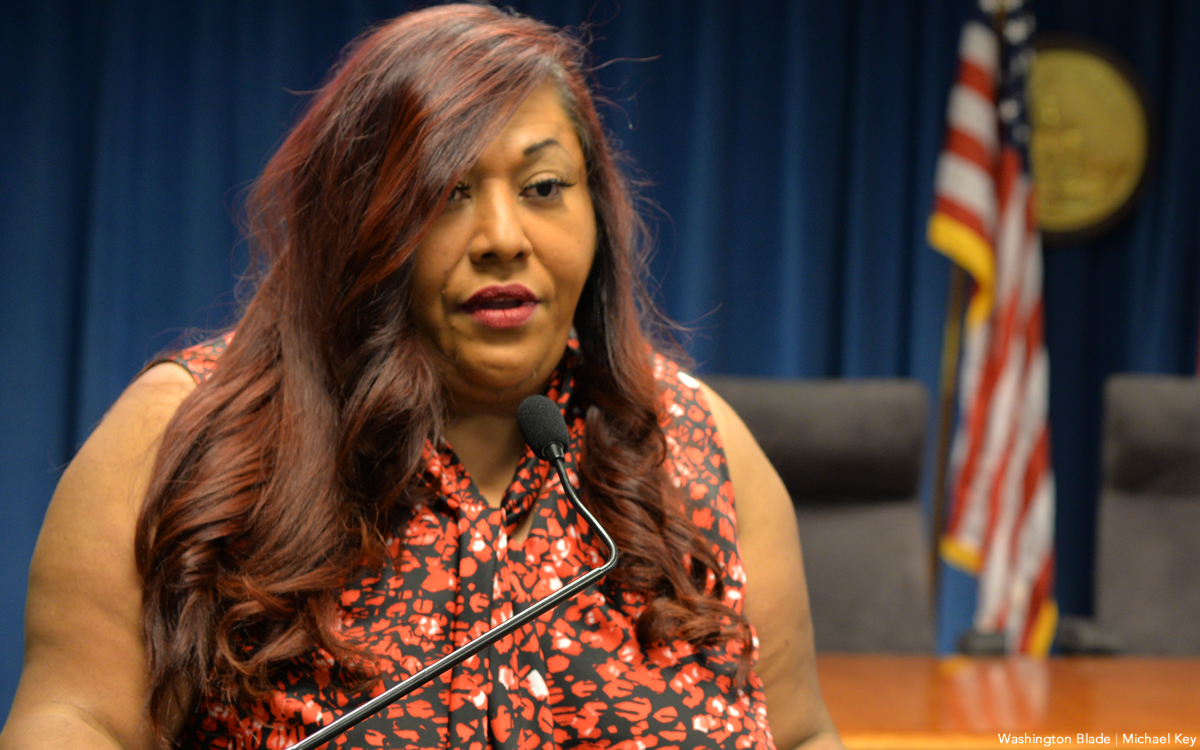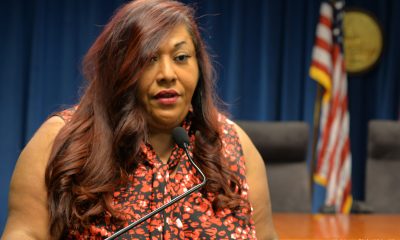Local
Ruby Corado resigns as head of Casa Ruby
Abrupt decision comes after loss of $850K D.C. grant

Ruby Corado, the founder and executive director of the D.C. LGBTQ community services center Casa Ruby, announced in a Facebook live video message that she had resigned from her position as leader of Casa Ruby effective on Friday.
Joining Corado in the Facebook broadcast was Casa Ruby Government Affairs Director Alexis Blackmon, who Corado said would immediately assume the position of interim executive director until the completion of a search for a permanent director.
Last year, Corado disclosed she planned to step down as Casa Ruby’s executive director sometime in 2022 to work full time on an LGBTQ-related consulting practice that she said she had begun part-time while continuing her role as Casa Ruby executive director.
In her Facebook announcement, Corado said she decided to step down at this time in response to an ongoing dispute with the D.C. government which resulted in a decision last week by the D.C. Department of Human Services to discontinue its $850,000 annual grant that has funded Casa Ruby’s emergency “low barrier” shelter for homeless LGBTQ youth and adults.
DHS has declined to disclose its reason for terminating the Casa Ruby grant, saying only that it will continue its full funding for services for LGBTQ youth who experience homelessness through grants to other organizations.
DHS informed Corado of its decision to discontinue the grant less than a week before the end of the fiscal year, with the funding set to stop on Sept. 30. At Corado’s initiative, Casa Ruby launched a GoFundMe fundraising campaign that had raised just over $100,000 as of Friday, a development that Corado says highlights the community’s support for Casa Ruby and its numerous programs, many of which support transgender people and LGBTQ immigrants.
Corado stated in her Facebook announcement that officials at the DHS, who she did not identify, were attempting to use her as a “distraction” to divert attention from the harm Corado said would come from the city agency’s decision to defund the Casa Ruby homeless services program.
Earlier this week, Corado said she believes the defunding of the Casa Ruby homeless program allegedly came in retaliation for a Casa Ruby complaint filed against the DHS by Casa Ruby earlier this year. The complaint charges that a DHS official had acted in a hostile and abusive way toward Corado and Casa Ruby staffers who were operating the homeless shelter.
Corado said she also believes the defunding may be in response to her refusal to agree to a DHS request that she move the Casa Ruby homeless facility to a location in Northeast D.C. that Corado believed to be an unsafe neighborhood for her clients, especially those who are trans. DHS declined a request from the Washington Blade for comment on the Casa Ruby complaint, saying it was under investigation.
In response to a question from the Blade at an Oct. 4 press conference on an unrelated subject, Mayor Muriel Bowser said she would “make the Department of Human Services available” to address the Blade’s question of why Casa Ruby’s funding was not renewed for its LGBTQ shelter program.
“We do business with organizations all the time,” the mayor said. “And sometimes we continue our relationship and other times we don’t. Largely it is based on an evaluation of the effectiveness of the program. So, I can say that.”
“And I can also say there are opportunities all the time for organizations to work with us,” Bowser continued. “And in some rounds or contract rounds it doesn’t work out and in subsequent rounds it might. And that may be the case with Casa Ruby.”
A DHS spokesperson did not respond to a Blade follow-up question this week asking for the reason the agency terminated the Casa Ruby funding.
Corado couldn’t immediately be reached on Friday to determine whether Casa Ruby had raised enough private funds to keep its main shelter open that has operated out of its headquarters building at 7530 Georgia Ave., N.W. In its GoFundMe appeal, Corado said the shelter might be forced to close on Friday.
Blackmon, an African American trans woman, recently received a degree from Georgetown University in the field of nonprofit management, according to Corado, who called Blackmon a highly committed and knowledgeable Casa Ruby team member “who everybody loves.”
Corado also stated in her Facebook broadcast that she will take a three-month sabbatical after which she will return to develop a stepped up private fundraising program for Casa Ruby so that the organization will no longer be dependent on D.C. government funding.
On the same day Corado announced her resignation, the local nonprofit homeless services organization Covenant House Greater Washington announced it was opening on Friday a homeless facility for LGBTQ youth in the city’s Deanwood neighborhood in Ward 7.
“Covenant House Greater Washington is pleased to announce SHINE — a new safe space initiative created for LGBTQ+ populations,” the group said in a statement. “The program will provide emergency shelter, crisis stabilization and short-term housing options to young people in the greater Washington region.”
The statement says the facility, a three-story building, consists of 24 beds, case management services, and “an array of support from various community-based organizations currently working with LGBTQ+ youth.”
The new Covenant House facility adds to the LGBTQ youth homeless facilities currently being operated by Casa Ruby and two other LGBTQ organizations for more than a decade — the Wanda Alston Foundation and SMYAL, the D.C. LGBTQ youth advocacy and services organization.
The Washington Post reports that the DHS awarded Covenant House a $648,000 grant to create and operate its new LGBTQ youth homeless facility.
In its statement announcing the opening of the new facility, Covenant House said the facility will be led by its newly hired program director, Taylor Chandler Walker, a trans woman who has been involved with local LGBTQ organizations; including Capital Pride Alliance, Us Helping Us, and the LGBT Budget Coalition.
District of Columbia
Ruby Corado sentencing postponed for third time
Attorneys say former Casa Ruby director has ‘significant medical issues’

A federal judge on April 8 approved a request by defense attorneys to postpone the sentencing of Ruby Corado, the founder and executive director of the now closed D.C. LGBTQ community services organization Casa Ruby on a charge of wire fraud, from April 29 to July 29.
Court records show that Judge Trevor N. McFadden of the U.S. District Court for the District of Columbia approved a motion filed by Corado’s two defense attorneys on that same day calling for the sentencing postponement on grounds of health issues.
“Ms. Corado has significant medical issues,” the April 8 motion states. “She has an important medical appointment related to one of her diagnoses scheduled in June 2025 and will need time to recover from that appointment,” it says.
The motion gives no further details on Colorado’s medical issues. A.J. Kramer, director of the D.C. Office of the Federal Public Defender, whose attorneys are representing Corado, said the office has a policy of never disclosing specific medical related information regarding its clients.
Court records show that prosecutors with the Office of the U.S. Attorney for D.C. did not object to the defense motion seeking the third sentencing postponement.
The records show that an earlier postponement of the sentencing, from March 28 to April 29, was initiated by the judge due to a scheduling conflict. The first postponement from Jan. 10 to March 28 came at the request of Corado’s attorneys, court records show.
Corado pleaded guilty on July 17, 2024, to a single charge of wire fraud as part of a plea bargain deal offered by prosecutors. The charge to which she pleaded guilty says she allegedly diverted at least $150,000 “in taxpayer backed emergency COVID relief funds to private offshore bank accounts for her personal use,” according to a statement released by the U.S. Attorney’s office.
Prosecutors have said funds that Corado allegedly diverted for her own use were intended to be used by Casa Ruby in support of its various programs, including housing services for homeless LGBTQ youth and support for LGBTQ immigrants.
The U.S. Attorney’s statement also notes that in 2022, when “financial irregularities at Casa Ruby became public,” Corado sold her home in Prince George’s County, Md. and “fled to El Salvador.” It was at that time that Casa Ruby ceased its operations.
Court records show that FBI agents arrested Corado on March 5, 2024, at a hotel in Laurel, Md., shortly after she returned to the U.S. At the request of her attorney and against the wishes of prosecutors, another judge at that time agreed to release Corado into custody of her niece in Rockville, Md., under a home detention order.
The release order came seven days after Corado had been held in jail at the time of her arrest by the FBI.
Under the federal wire fraud law Corado could be sentenced to a possible maximum sentence of 30 years in prison, according to the U.S. Attorney’s statement. However, court observers have said that due to Corado’s decision to waive her right to a trial and plead guilty, prosecutors will likely ask the judge to hand down a lesser sentence than the maximum sentence.
The statement by prosecutors points out that Corado’s decision to plead guilty to the one charge came after she had been charged in a criminal complaint filed on March 1, 2024, with bank fraud, wire fraud, laundering of monetary instruments, monetary transactions in criminally derived proceeds, and failure to file a report of foreign bank accounts.
All those charges except for the wire fraud charge were dropped at the time of her guilty plea.
District of Columbia
A room with Pride: D.C.’s LGBTQ history finds a new home at the Eaton
New suites highlight city’s queer community

Blocks away from where Frank Kameny once organized the first pickets for gay rights in Washington, a new hotel suite invites guests to relax, recharge, and revel in the LGBTQ history of the city with the capital’s first-ever Pride-themed room at the Eaton Hotel.
From the walls covered in Washington Blade archival photos from the past 50 years, to a vinyl library that spans decades and genres of music celebrated by LGBTQ fans, and little affirmations written on the mirrors, it becomes clear as soon as you open the door that this room is one of a kind.
The Blade sat down with Nina Ligon, the director of culture for the Eaton, in the suite to discuss why the boutique hotel has chosen to debut a Pride-themed room and how their unique mission-driven hospitality is at the center of it all.
Starting with how the relationship between the Blade and Eaton came to be, Ligon explained that the collaboration with D.C.’s principal LGBTQ newspaper has been around longer than she has been with the hotel.
“The Blade has always been present,” Ligon said. “It’s one of the entities here in the city that’s just always been around. When I came into my position here at Eaton, Sheldon Scott — our original director of culture who helped open the hotel — already had a relationship with Stephen [Rutgers] and other members of the Washington Blade. Through that we have been able to establish a really strong relationship in the city.”
That relationship flourished after the boutique hotel, which sees itself as more than a hotel — but a cultural hub for those wishing to explore Washington — was nominated for the Best of LGBTQ DC Awards, given out and published by the Blade.

“Beginning in 2022 we were first voted for best LGBTQ hotel in the city by the Best of LGBTQ DC Awards,” she said. “In 2023 we fell off, but that’s all right. We did get Editor’s Choice in 2024, and we’re gonna make a comeback.”
That comeback, Ligon hopes, is aided by the addition of the new Capital Pride-themed hotel suite, which used feedback from LGBTQ hotel staff to determine what went in the room.
“It’s community. We have a really great team here at Eaton, so we were able to put together a committee with anyone who wanted to be involved and have some say. And that’s not just the pride suite specifically, but World Pride in general — in our pride efforts, 365, right throughout the year. A lot of these,” she said, pointing to the walls covered in framed photos taken from the Blade archive, “are ideas that came up during those early meetings just a few months ago. There were discussions of inflatable chairs and disco balls, and I was for it. I’m here to support their creative vision. And you know, we have to involve the corporate folks, and they’re a little more traditional than some of us. But the team really came together with some of the pieces and the timeline wall art that we’re working on.”
Ligon continued, explaining that special attention was given to ensure diverse LGBTQ experiences are represented in the room. From the pictures of LGBTQ icons like Marsha P. Johnson and RuPaul, to the music on their sound system (including Chappell Roan’s “The Rise and Fall of a Midwest Princess” and Troye Sivan’s “Bloom”), and the quotes on the walls, their goal was to uplift the whole LGBTQ community rather than one particular identity.
“My colleague, Eduardo [Romero], who’s been just a beam of light in my life, brought this to my attention. As a Black woman, I was reading through the Blade’s archive links and was sifting through some of those and he was like, ‘Okay, yeah, these look good, but there’s some people who are missing.’ Capital Pride has been traditionally cis, white male led. He helped me, as a Black woman, to step back and say. ‘Say, oh, wait, there’s more that we can be representing here. There are more people we could be representing.’ And so I reached out to DC Black Pride to see what image imagery they may have had and what input they had. And we were able to come up with a little something.”
As the tour of the room came to a close, Ligon told the Blade what she hopes people get from staying in this suite.
“When it comes to Pride, Pride is resistance,” she said. “Pride is more than just a party. Pride is an opportunity. It started with people who were fighting for their rights and their mere existence. And so I really want people, whether they come here to party or to take a load off, I really want them to take some time to reflect and see Pride for what it is, and that first being a form of resistance as we chart the course forward into a brighter future for the LGBTQ community and for all. None of us are free until we are all free. And I hope that this will be a reflection of that.”
The Eaton Hotel is at 1201 K St., N.W.

Opinions
We must show up to WorldPride 2025 in D.C.
Boycotts offer symbolic protest, but absence creates silence

As an LGBTQI+ activist from Argentina, a country currently facing deep setbacks under an openly anti-rights government, I understand the frustration and fear many are expressing about attending WorldPride 2025 in the United States. I also understand the symbolic weight of showing up anyway.
Following the announcement by Egale Canada and the African Human Rights Coalition that they are withdrawing support for WorldPride due to the Trump administration’s anti-LGBTQI+ stance, concerns have rightly been raised about safety, complicity, and principle. These concerns must not be dismissed. But they must be responded to with a deeper strategic reflection: Visibility, presence, and collective action remain our greatest tools in confronting oppression.
Boycotts may offer symbolic protest, but absence creates silence
WorldPride is not organized by the U.S. government. It is a platform created by and for LGBTQI+ civil society — local activists, grassroots groups, trans-led collectives, BIPOC-led organizations, and everyday people building community despite hostile political environments. Boycotting this space sends a message not only to the Trump administration, but to our own movement: That when things get hard, we retreat.
History teaches us otherwise.
In 1990, amid the AIDS crisis and government neglect, activists did not boycott — they stormed the National Institutes of Health and the FDA. In 2014, when Russia passed its “gay propaganda” law, global solidarity at the Sochi Olympics became a powerful moment of protest and resistance. And in 2020, amidst a pandemic and police violence, Pride went digital but never disappeared.
If we set the precedent that global LGBTQI+ events cannot happen under right-wing or anti-LGBTQI+ governments, we will effectively disqualify a growing list of countries from hosting. That includes not only the U.S. under Trump, but Hungary, Italy, Uganda, Poland — and even my own country, Argentina, under Javier Milei. Yet ILGA World still plans to convene its 2027 conference in Buenos Aires, and rightly so. We must not surrender global platforms to the very governments that wish to erase us.
WorldPride is not a reward for good governance. It’s a tool of resistance
To those who say attending WorldPride in D.C. normalizes Trump’s policies, I say: What greater statement than queer, trans, intersex, and nonbinary people from around the world gathering defiantly in his capital? What more powerful declaration than standing visible where he would rather we vanish?
Safety is paramount, and all governments — including the U.S. — must guarantee the protection of LGBTQI+ participants. But refusing to engage is not the answer. In fact, visibility in hostile spaces has always been a hallmark of our movement’s strength. We showed up at Stonewall. We marched on Washington in 1979. We protested during the AIDS crisis, and we will show up again now — not in spite of adversity, but because of it.
We are in a global moment of rollback. Division is what our opponents want
The rise of anti-gender ideology and trans-exclusionary narratives has created fertile ground for far-right movements worldwide. In this moment, LGBTQI+ solidarity must be global, intersectional, and uncompromising. We cannot afford to fracture our own movement based on geopolitical fault lines.
Egale Canada and the African Human Rights Coalition raised legitimate criticisms — of U.S. foreign policy, immigration barriers, and systemic racism. But those issues must be confronted within WorldPride, not from outside it. We must bring those critiques into plenaries, panels, and the streets of Washington. We must create space for diasporic, racialized, and grassroots-led voices. We must use this moment to hold institutions accountable and shift the power of Pride to those most affected.
Because that is what solidarity looks like — not abandonment, but engagement.
WorldPride 2025 must not be a party disconnected from reality. It must be a protest rooted in our global truths.
Let us not cede this space. Let us make it ours.
Mariano Ruiz is the president of Derechos Humanos y Diversidad Asociación Civil in Argentina. He is also a 2019 Columbia HRAP Alumni.
-

 Virginia3 days ago
Virginia3 days agoYoungkin calls on gay Va. GOP LG candidate to exit race over alleged ‘porn’ scandal
-

 Commentary5 days ago
Commentary5 days agoA conversation about queers and class
-

 Kenya5 days ago
Kenya5 days agoKenya Red Cross-owned hotel to host anti-LGBTQ conference
-

 Opinions4 days ago
Opinions4 days agoNavigating employer-sponsored health insurance, care









